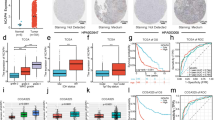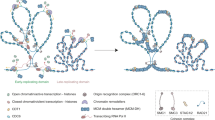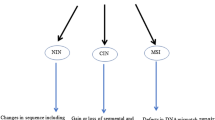Abstract
Minichoromosome maintenance (MCM) proteins play key role in cell cycle progression by licensing DNA replication only once per cell cycle. These proteins are found to be overexpressed in cervical cancer cells. In this study, we depleted MCM4, one of the MCM 2–7 complex components by RNA interference (RNAi) in four cervical cancer cell lines. The four cell lines were selected on the basis of their human papillomavirus (HPV) infection: HPV16-positive SiHa, HPV18-positive ME-180, HPV16- and HPV18-positive CaSki, and HPV-negative C-33A. The MCM4-deficient cells irrespective of their HPV status grow for several generations and maintain regular cell cycle. We did not find any evidence of augmented response to a short-term (48 h) cisplatin treatment in these MCM4-deficient cells. However, MCM4−/HPV16+ SiHa cells cannot withstand a prolonged treatment (up to 5 days) of even a sublethal dosage of cisplatin. They show increased chromosomal instability compared to their control counterparts. On the other hand, MCM4-deficient CaSki cells (both HPV16+ and 18+) remain resistant to a prolonged exposure to cisplatin. Our study indicates that cervical cancer cells may be using excess MCMs as a backup for replicative stress; however, its regulatory mechanism is dependent on the HPV status of the cells.





Similar content being viewed by others
References
Bell SP, Dutta A. DNA replication in eukaryotic cells. Annu Rev Biochem. 2002;71:333–74.
Forsburg SL. Eukaryotic MCM, proteins: beyond replication initiation. Microbiol Mol Biol Rev. 2004;68:109–31.
Kuijjer ML, Rydbeck H, Kresse SH, Buddingh EP, Lid AB, Roelofs H, et al. Identification of osteosarcoma driver genes by integrative analysis of copy number and gene expression data. Gene Chromosomes Cancer. 2012;51:696–706.
Das M, Singh S, Pradhan S, Narayan G. MCM Paradox: abundance of eukaryotic replicative helicases and genomic integrity. Mol Biol International. 2014:574850.
Zhong X, Chen X, Guan X, Zhang H, Ma Y, Zhang S, et al. Overexpressions of G9a and MCM7 in esophageal squamous cell carcinoma associated with poor prognosis. Histopathology. 2015;66:192–200.
Madine MA, Swietlik M, Pelizon C, Romanowski P, Mills AD, Laskey RA. The roles of the MCM, ORC and Cdc6 proteins in determining the replication competence of chromatin in quiescent cells. J Struct Biol. 2000;129:198–210.
Blow JJ, Hodgson B. Replication licensing—defining the proliferative state? Trends Cell Biol. 2002;12:72–8.
Shreeram S, Sparks A, Lane DP, Blow JJ. Cell type-specific responses of human cells to inhibition of replication licensing. Oncogene. 2002;21:6624–32.
Feng D, Tu Z, Wu W, Liang C. Inhibiting the expression of DNA replication-initiation proteins induces apoptosis in human cancer cells. Cancer Res. 2003;63:7356–64.
Liu M, Li JS, Tian DP, Huang B, Rosqvist S, Su M. MCM2 expression levels predict diagnosis and prognosis in gastric cardiac cancer. Histol Histopathol. 2013;28:481–92.
Erkan EP, Strobel T, Lewandrowski G, Tannous B, Madlener S, Czech T, et al. Depletion of minichromosome maintenance protein 7 inhibits glioblastoma multiforme tumor growth in vivo. Oncogene. 2014;33:4778–85.
Das M, Prasad SB, Yadav SS, Govardhan HB, Pandey LK, Singh S, et al. Over expression of minichromosome maintenance genes is clinically correlated to cervical carcinogenesis. PLoS One. 2013;8:e69607.
Narayan G, Arias-Pulido H, Nandula SV, Basso K, Sugirtharaj DD, Vargas H, et al. Promoter hypermethylation of FANCF: disruption of Fanconi Anemia-BRCA pathway in cervical cancer. Cancer Res. 2004;64:2994–7.
Narayan G, Bourdon V, Chaganti S, Arias-Pulido H, Nandula SV, Rao PH, et al. Gene dosage alterations revealed by cDNA microarray analysis in cervical cancer: identification of candidate amplified and overexpressed genes. Gene Chromosomes Cancer. 2007;46:373–84.
Baay MF, Quint WG, Koudstaal J, Hollema H, Duk JM, Burger MP, et al. Comprehensive study of several general and type-specific primer pairs for detection of human papillomavirus DNA by PCR in paraffin-embedded cervical carcinomas. J Clin Microbiol. 1996;34:745–7.
Shukla S, Bharti AC, Mahata S, Hussain S, Hedau S, Sharma R, et al. Application of a multiplex PCR to cervical cells collected by a paper smear for the simultaneous detection of all mucosal human papillomaviruses (HPVs) and typing of high-risk HPV types 16 and 18. J Med Microbiol. 2010;59:1303–10.
Symeonidou IE, Kotsantis P, Roukos V, Rapsomaniki MA, Grecco HE, Bastiaens P, et al. Multi-step loading of human minichromosome maintenance proteins in live human cells. J Biol Chem. 2013;288:35852–67.
Woodward AM, Gohler T, Luciani MG, Oehlmann M, Ge X, Gartner A, et al. Excess Mcm2-7 license dormant origins of replication that can be used under conditions of replicative stress. J Cell Biol. 2006;173:673–83.
Alver RC, Chadha GS, Blow JJ. The contribution of dormant origins to genome stability: from cell biology to human genetics. DNA Repair (Amst). 2014;19:182–9.
Ge XQ, Jackson DA, Blow JJ. Dormant origins licensed by excess Mcm2-7 are required for human cells to survive replicative stress. Genes Dev. 2007;21:3331–41.
Ibarra A, Schwob E, Mendez J. Excess MCM proteins protect human cells from replicative stress by licensing backup origins of replication. Proc Natl Acad Sci U S A. 2008;105:8956–61.
Hausen ZH. Papillomaviruses and cancer: from basic studies to clinical application. Nat Rev Cancer. 2002;2:342–50.
Saxena A, Yashar C, Taylor DD, Gercel-Taylor C. Cellular response to chemotherapy and radiation in cervical cancer. Am J Obstet Gynecol. 2005;192:1399–403.
Nicholas S E, Schwacha A. The Mcm2-7 replicative helicase: a promising chemotherapeutic target. BioMed Res International. 2014:549719.
Galluzzi L, Senovilla L, Vitale I, Michels J, Martins I, Kepp O, et al. Molecular mechanisms of cisplatin resistance. Oncogene. 2012;31:1869–83.
Vici P, Mariani L, Pizzuti L, Sergi D, Di Lauro L, Vizza E, et al. Emerging biological treatments for uterine cervical carcinoma. J Cancer. 2014;5:86–97.
Tommasino M. The human papillomavirus family and its role in carcinogenesis. Sem Cancer Biol. 2014;26:13–21.
Acknowledgments
The authors thankfully acknowledge the financial support from the Department of Biotechnology, Government of India (vide project no. BT/PR9246/Med/30/17/2007), to GN, SS, and SP; Banaras Hindu University (XIth Plan) to SS; Council of Scientific and Industrial Research, Government of India, for research fellowship to MD; and Interdisciplinary School of Life Sciences, Faculty of Science, Banaras Hindu University for equipment facilities.
Conflicts of interest
None
Author information
Authors and Affiliations
Corresponding author
Rights and permissions
About this article
Cite this article
Das, M., Prasad, S.B., Yadav, S.S. et al. HPV-type-specific response of cervical cancer cells to cisplatin after silencing replication licensing factor MCM4. Tumor Biol. 36, 9987–9994 (2015). https://doi.org/10.1007/s13277-015-3782-7
Received:
Accepted:
Published:
Issue Date:
DOI: https://doi.org/10.1007/s13277-015-3782-7




